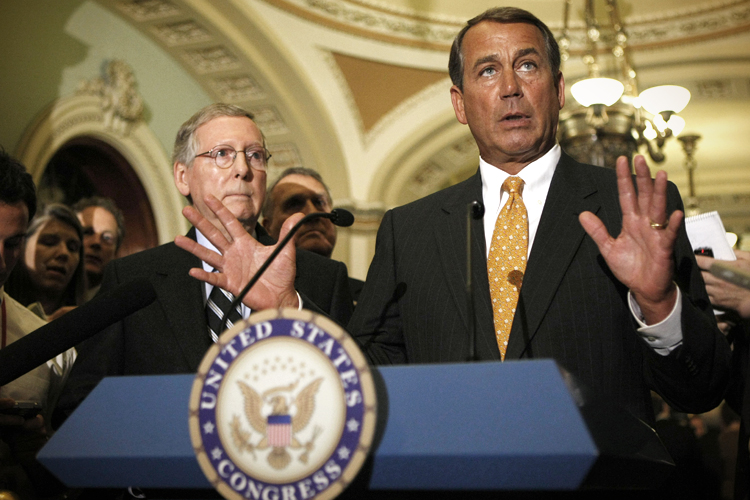Conscience is suddenly all the rage in Congress. Public opinion too. It’s amazing and depressing how popular these terms — “conscience” and “public opinion,” in particular — have suddenly become in the past several days, as if elected officials and policymakers believe they should get extra credit on the rare occasions that they listen to voters and then do what they think is in their best interests.
“All votes authorizing the use of military force are conscience votes for members,” said a spokesman for House Speaker John Boehner last week.
“This is a vote of conscience,” Secretary of State John Kerry explained in a Huffington Post Op-Ed on Friday. “And I know that the same reasons that compelled me to join the United States Navy and serve, and the same reasons that compelled me to speak out against the war in which I’d fought, tell me now that the cause of conscience and conviction is the cause for action in Syria.”
Members who intend to vote against the authorization want reporters to know that their constituents are overwhelmingly opposed to the president’s plan.
This is as it should be. And it’s a big reason why President Obama went on national television last night and admitted his request for the authority to strike Syria will likely be denied.
“I wouldn’t say I’m confident,” he told NBC’s Savannah Guthrie. “I’m confident that the members of Congress are taking this issue very seriously and — and they’re doing their homework and I appreciate that.”
But it’s also, unintentionally, a huge indictment of the normal course of business on Capitol Hill.
Other matters of public policy — domestic and international, security and economic — have huge consequences for people’s lives. Life and death in some cases. And yet when the question before Congress is something other than whether or not to grant the president authority to bomb another country, members find it easy to turn down the volume on their consciences and the annoying din of public opinion.
It happens all the time. It happened earlier this year after the massacre at Sandy Hook elementary school in Newtown, Conn. Public opinion broadly favored taking measures to curb gun violence. Modest measures like expanding background checks for gun buyers polled extremely well. In April, constituent callers supporting the Senate’s background check bill drowned out the meek voices of the opposition, too ashamed to argue robustly that the response to public assault weapons massacres should be “nothing.”
And yet Republicans filibustered that bill, constituents and conscience be damned.
Right now in the House of Representatives, GOP leaders are erecting an arbitrary hurdle to the passage of comprehensive immigration reform — an idea a majority of the country supports, enshrined in a piece of legislation that passed the Senate on a bipartisan basis in June.
That bill, or something very similar, would pass in the House pretty easily — if House Speaker John Boehner put it on the floor for a “vote of conscience.” Instead, he’s refusing to advance any immigration legislation unless he knows in advance that at least 117 of his members will support it. That’s just over a quarter of the House.
Here’s an issue that a majority of the country supports, one that both national parties claim to have an interest in advancing, that would improve the lives of millions of Americans, and people living in America, if it passed. And yet politicians and most of the press corps treat this invocation of the “Hastert rule,” erected to quiet intra-party disputes and secure Boehner’s speakership, as totally ordinary — a morally uninteresting choice.
I’d grant that members of Congress ought to view war votes differently from other votes. It’s more unseemly to horse trade, or vote against conscience, when the question at hand is whether to rain hellfire on other human beings. As I argued here, it’d be morally perverse for Democrats to support Obama’s request to attack Syria because they’re worried about what will happen to immigration reform if his effort fails. But what if Obama wasn’t proposing war. What if this were instead a debate about a budget bill that many Democrats privately opposed? If they worried that defeating the president’s “grand bargain” would kill immigration reform, and let that possibility influence their vote, then the moral calculation is less clear.
And of course, sometimes public opinion and political conscience run in opposite directions. Unless Syria polling changes dramatically this week, that’s what Obama will be hoping when the Senate authorization comes up for a vote in the days ahead. Likewise, in 2010 Democrats passed a healthcare reform bill that didn’t have public support on the strength of appeals to conscience.
But that’s not what the driving calculation on Capitol Hill has been for the past several years. Senate Minority Leader Mitch McConnell turned his members into a unified bloc of opposition to all of Obama’s proposals not because all Republicans agreed on the merits, but to fracture the Democratic Party and drive down Obama’s approval ratings and public support for his agenda.
This has been “normal” on Capitol Hill for a while now. It’s why the terms members use to describe the debate over Syria seem so alien. But the implication that it’s appropriate for partisan commitments to trump substantive concerns in almost every other legislative debate — that’s what ought to sicken the conscience.

